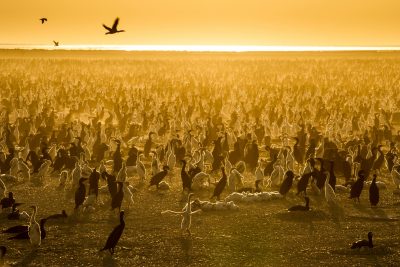
Netflix released its latest nature documentary series, “Our Planet,” on Friday. The series features eight episodes from the Arctic to the Serengeti. The series is produced by the World Wildlife Fund and narrated by David Attenborough.
Like most good nature documentaries, “Our Planet” educates viewers on the world and the animals that live in it. But “Our Planet” also has another goal: to convince viewers that conservation efforts are worth our attention.
The first episode serves as an introduction to Earth and our interactions with the species that share the planet with us. Attenborough explains it is more important than ever to work together to protect the planet.
The remaining seven episodes focus on the seven different habitats: the tundra, jungles, coastal seas, deserts and grasslands, high seas, fresh water and forests. The episodes explore native animals and how each species can compete and depend on the others, and they broadly discuss how humans and the environment are intertwined.
At the end of each episode, there is information that directs viewers to ourplanet.com to learn more about the habitats on the show
The documentary-series never feels preachy. “Our Planet” serves primarily to present interesting moments in nature and to highlight our planet’s diversity while occasionally mentioning the impact of humans on the environment.
“Our Planet” doesn’t need to be preachy to deliver its message, though. The series moves people to care by showcasing beautiful and unique animals and directly telling viewers how these species are affected by human actions.
It can be easy for humans to ignore how our actions affect the world around us, as we don’t always see the consequences. The stories of “Our Planet” are so beautiful and dramatic it is often difficult to look away, forcing viewers to really take in the series’ central message: the human impact on our environment must be addressed.
“Our Planet” finds a way to be educational without sounding boring. It achieves this partially through Attenborough’s engaging narration.
The acclaimed British narrator is a careful craftsman, forging engaging word choices and voice inflections. Instead of simply regurgitating facts about the animals, Attenborough tells their unique stories.
Just as a novelist would describe fictional characters in a book, Attenborough pairs the animals’ struggles to survive and mate with compelling storylines, detailing their motivations and journeys for the audience.
Attenborough’s narration is perfectly complemented by the music of Steven Price, best known for his Academy Award-winning score for “Gravity.” Price’s music — whether it’s a playful background track for birds of paradise performing mating dances or a dramatic soundtrack for a predator-prey chase — adds life to the animals’ stories.
Environmental issues can often make for bleak discussion topics, especially given recent political controversies with government administrations. But “Our Planet” discusses these issues in a realistic yet hopeful tone.
The series does not sugarcoat. It is made clear the consequences of human consumption and expansion are dire. On multiple occasions, “Our Planet” cites statistics that show how certain habitats have been declining in more recent years.
But at the same time, “Our Planet” never paints these issues as unfixable. In fact, the series emphasizes the opposite — it inspires viewers to rebuild and to focus on the light at the end of the tunnel. All hope is not lost, the series seems to say.
“Our Planet” contributes a much needed voice to the discussion of conservation and sustainability: restoring the world is not beyond our grasp just yet.
















































































































